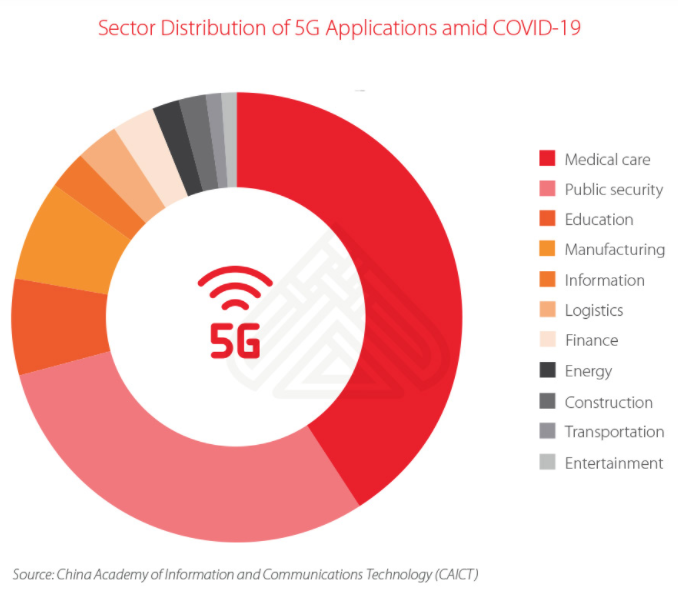5G is a new technology field that all countries are striving to deploy in the new era. The construction process of the smart grid which integrates 5G and UHV transmission technology is accelerating. After the construction of power energy represented by UHV, the construction of power information represented by 5G is gradually carried out. Because of its excellent communication characteristics, 5G can realize two-way communication at the distribution side of the smart grid, help the smart grid realize real-time sensing, massive transmission, intelligent decision-making and other functions, and provide a strong guarantee for the information construction of smart grid.
However, for the global 5G industry, the year 2020 did not usher in the expected “5G explosion” of joy, but rather a major blow to the supply and consumption side of the global outbreak of the COVID-19. As a result of the epidemic, the global 5G rollout was greatly delayed.
China is committed to restoring production lines
As an important force in the production and market construction of 5G equipment in the world, China has gradually controlled the domestic epidemic and promoted the resumption of work, which has brought benefits to the whole industry.

Due to the gradual control of the domestic epidemic, China’s 5G construction began to recover in the second quarter of 2020. Most of the production terminals of 5G basic devices, telecommunications equipment and terminal equipment are concentrated in China. Benefiting from a well-controlled epidemic, the supply chain and production lines will soon recover and even speed up the localization process of key components, especially the RF front-end, to a certain extent.
South Korea fears loss of industry leadership
The COVID-19 pandemic is threatening South Korea’s leading position in the 5G field. According to Korean media reports, in order to overcome the impact of the pandemic, South Korea’s Ministry of Science and ICT stressed that it is imperative to expand investment in the fields of communication infrastructure and cultural industries while avoiding the bankruptcy of the relevant SMEs.
The Korea Information Technology Promotion Agency suggested that the government should pay attention to the importance of infrastructure development such as 5G communication from the perspective of dealing with the “post-Coronavirus Era”, especially to strengthen the integration and development of the latest technologies such as artificial intelligence, big data, and cloud computing. The director believes that the aftermath of the epidemic will trigger drastic economic and social changes and that Korea should take advantage of the power of existing digital technology to actively create new economic growth industries.

Korean media reported that the Ministry of Science and ICT had reached a 5G promotion plan with major South Korean communication companies earlier this month. It plans to establish 5G base stations in more than 2000 indoor places such as subway stations and department stores, expand 5G indoor coverage, and launch 5G independent networking services to ensure that users will not suddenly switch to 4G mode when using 5G services. The Korean government will also invest 650 billion won to foster strategic 5G industries, including 15 fields such as next-generation smartphones, AR&VR devices, self-driving cars, and healthcare.
Europe’s 5G development forced to slow down
In Europe, the development of some services that hope on 5G technology, such as driverless technology, automated factory workshops and smart cities, is limited, and 5G spectrum auctions in Italy, Spain, France and Austria have also been postponed.
The year 2020 was supposed to be the time for EU member states to turn on 5G, and countries are allocating frequency bands and building 5G facilities. However, due to the pandemic, until 2021, the 5G plans of various countries are still forced to be shelved. Experts said that since the pandemic in Europe may last longer than in Asia, and EU countries have no unified opinion on the choice of 5G equipment suppliers, the 5G construction of EU will lag behind China and other Asian countries for at least one or two years.
German media believe that the COVID-19 allows Europe to find its own technology gap. For example, Asian countries use 5G, big data and other future technologies on a large scale, while Europe is significantly behind, making the fight against the pandemic ineffective. Peter Altmaier, the Federal Minister of Germany for Economic Affairs and Energy has already said that after the epidemic, Germany will re-examine the development of future technologies such as 5G in Germany, invest more in R&D, and cooperate with European countries to strengthen the EU’s 5G strength.
The COVID-19 is the beginning of the EU’s digital transformation. According to a leaked EU document, the EU will “thoroughly analyze the experience of the New Coronavirus outbreak” and develop future policy measures in the digital field. In the wake of this pandemic crisis, the areas of “e-health, digital education, e-government, data exchange and broadband connectivity” should receive special attention.
